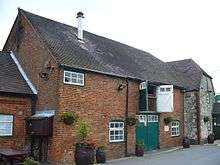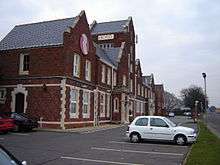Tongham
| Tongham | |
| The church in the village is 19th century and the only church in Surrey to have a separate belfry |
|
 Tongham |
|
| Area | 3.3 km2 (1.3 sq mi) |
|---|---|
| Population | 2,314 (Civil Parish)[1] |
| – density | 701/km2 (1,820/sq mi) |
| OS grid reference | SU8849 |
| Civil parish | Tongham |
| District | Guildford |
| Shire county | Surrey |
| Region | South East |
| Country | England |
| Sovereign state | United Kingdom |
| Post town | Farnham |
| Postcode district | GU10 |
| Dialling code | 01252 |
| Police | Surrey |
| Fire | Surrey |
| Ambulance | South East Coast |
| EU Parliament | South East England |
| UK Parliament | Surrey Heath |
Coordinates: 51°14′13″N 0°43′55″W / 51.237°N 0.732°W
Tongham is a Surrey village across a narrow double divide from the easterly park and business estate of the town of Aldershot, north-east Hampshire. The village's buildings occupy most of the west of the civil parish, adjoining the A31 and the A331. The boundaries take in Poyle Park in the east and the replacement to Runfold's manor house in the west.
Aldershot is centred 1.5 miles (2.4 km) west. As Tongham commences immediately on the north half of the Hog's Back, the thinnest part of the North Downs, the largest independent brewery in Surrey (the Hogs Back Brewery) takes its name from this eminence as does the Hog's Back Hotel. Tongham was the home of 'Aldershot Stadium' (1950–1992) which hosted primarily greyhound racing, stock car racing and speedway.
History and economy
Archaeological evidence suggests the area of Tongham has been occupied since Neolithic times, particularly close to the Pilgrims' Way which formerly covered in part the top of the Hogs Back, a ridge 60-50m above the surrounding area, but which is now the North Downs Way on the south side. Notable finds in the parish include two Neolithic arrowheads and Iron Age farmsteads.[2]
- Manor
The farmstead and what few peasants' buildings there were, in the feudal system gain early mentions as Twangham from the 13th century to the 16th century in the rent rolls of the successive Bishops of Winchester: Henry de la Poyle held court at Tongham manor in 1360. He had inherited the land from his grandfather, Walter de la Puille who held it rendering an annual small fee to the Bishop.[3]
The manor descended from the emblazoned, but not noble, Gaynesford and White families to holders in the Tichborne family. One of these proved to be less rewarded than Sir Benjamin Tichborne, 1st Baronet for proclaiming the new Stuart dynasty in Winchester, Sir Walter Tichborne. This less wealthy branch of the family sold it in 1725 to Richard Smith. In 1819 an exact namesake sold the manor with Thomas and Jane Barrett also having an interest, to Stephen Boyce whose stepson's family ending in Mj. Charles Stephen Barron and brother Cnl. Fenwick Boyce Barron held the manor and the manor remained, albeit gradually sold off, with a Barron until at least 1906.[3]
- Poyle Park
The manor of Poyle Park which decayed from a wealthy gentleman's architecturally impressive farmhouse into no more than a farm, was in the north of Seale but now forms most of the east of Tongham. In the 14th century Tongham, seemingly inclusive of this area, was assessed in the subsidy roll at £3 8s 5.5d. The Poyle family owned a synonymous manor in a parish of Guildford, held of the King, never the Bishops.[3] After the Gaynesford and Vyne families the family of Sir Nicholas Woodroffe, Lord Mayor of London for 1579, held it until at least 1906, by passing to female-line descendants the Chester family. In 1792 owner William Woodroffe (born Billinghurst) who was High Sheriff of Surrey for 1792 had his estate in bankruptcy (chancery) due to the expense of that office which he could not afford. Colonel Ross Donnelly Mangles, the Chairman of the East India Company was a tenant in the mid 19th century.[3]
- Evolution from the industrial revolution onwards
From the population abstracts from 1811 until its evolution into a parish the settlement was a rural one large enough in size to be official classed as a statistically recordable hamlet.[3] Tongham's now dismantled railway with a station here was important for transporting materials to build the new military camp of Aldershot from 1856 until 1870 and the row of shops developed from this line.[4] Its Church was completed in 1865 and Tongham (which had previously been part of the parish of Seale) was made into a separate parish the following year.[3]
The son of its first vicar, Archbishop of York Cyril Garbett was born in Tongham in 1875, a leader in the liturgy and charitable works of a large part of the Church of England. The military author and Honorary Remembrancer for the Borough of Aldershot (1963 to 1974), and Curator of the Aldershot Museum, Howard N. Cole, lived in the village.
Hogs Back Brewery

The twin oast houses in the village have been converted to residential use. Tongham nonetheless is home to the largest independent brewer in Surrey, with six other main breweries in the county. The Hogs Back Brewery (established 1992) produces 3,800 barrels per year (2012 figures) from its large 18th-century premises.[5] The brewery uses fuggles hops from the Hampton Park estate in Seale.[6]
Commuter/local work statistics
As part of the outer London Commuter Belt and well within the Aldershot Urban Area the means of travel shows most people aged 16–74 either use a motor vehicle to work outside of the village or to commute within it.
| Output area | Car or van | Not in paid work | Work mainly from home | Train | On foot | Bus[1] |
|---|---|---|---|---|---|---|
| (Civil Parish) | 1119 | 452 | 70 | 56 | 56 | 41 |
Amenities
Poyle farm cottage and the Hog's Back Hotel

A 17th cottage sits below the former manor, largely intact in terms of uninterrupted farmland named Poyle Farm.[7] The 'Legacy Farnham' Hog's Back Hotel features white stone quoining and dutch gables giving its 20th-century structure a character reminiscent of the former medieval grand manor house on the site.[8]
Pubs, shopping parade and other major outlet
.jpg)
Two pre-19th century large pubs are in Tongham: The White Hart on the main street (The Street) and The Cricketers on a western avenue off this, Oxenden Road. A diverse and relatively small shopping parade is in the village centre. The brewery operates an off-licence stocking non-proprietorial ales as well as its own.
Church
The 1865 church (to St Paul) used by Anglicans was designed by Ewan Christian and is Grade II listed and was 'erected by' (chiefly funded by) John Back who owned Aldershot Park, a large public park with many leisure facilities accessible via a track from the village, crossing the double divide of a river valley (with the Blackwater Valley Path) and dual carriageway.[9]
Former landmarks
Aldershot Stadium
Tongham was the home of 'Aldershot Stadium' (1950–1992) which hosted greyhound racing, stock car racing (and other short-oval motorsports) and speedway. The stadium lasted from 1950 until it was demolished for construction of the A331 road at the end of 1992.
Runfold medieval manor house
This building shares with other private plots a western spur of land, close to Runfold's traditional centre. This included much of the land which the A31 east-west dual carriageway is on, and four listed buildings north-west of this, close to Badshot Lea, one of which, Runfold House was a large 18th century house, however re-faced completely in the 19th century.[10][11]
Sport and leisure
Tongham has a Non-League football club Tongham F.C. who play at Poyle Road.[12]
According to the Guinness World Records 2003, Tongham also holds the world record for holding the most indisciplined Football Match ever against Hawley Youth Club on 3 November 1969. The referee booked all 22 players, including one who went to hospital and one of the linesman.[13] The match, which was won by Tongham 2-0, was described by a participating player as a "good hard game".
Demography and housing
| Output area | Detached | Semi-detached | Terraced | Flats and apartments | Caravans/temporary/mobile homes | shared between households[1] |
|---|---|---|---|---|---|---|
| (Civil Parish) | 244 | 290 | 314 | 144 | 5 | 0 |
The average level of accommodation in the region composed of detached houses was 28%, the average that was apartments was 22.6%.
| Output area | Population | Households | % Owned outright | % Owned with a loan | hectares[1] |
|---|---|---|---|---|---|
| (Civil Parish) | 2,314 | 997 | 28.3% | 44.5% | 330[1] |
The proportion of households in the civil parish who owned their home outright compares to the regional average of 35.1%. The proportion who owned their home with a loan compares to the regional average of 32.5%. The remaining % is made up of rented dwellings (plus a negligible % of households living rent-free).
Nearest other settlements
 |
North Town, Aldershot | Ash | Ash Green, Ash |  |
| Aldershot | |
across two hillside farms and woodlands Wanborough | ||
| ||||
| | ||||
| Badshot Lea Runfold |
Sandy Cross, Seale | Seale |
References
- 1 2 3 4 5 Key Statistics; Quick Statistics: Population Density United Kingdom Census 2011 Office for National Statistics Retrieved 21 November 2013
- ↑ History of the Blackwater Valley
- 1 2 3 4 5 6 H.E. Malden (editor) (1906). "Parishes: Seale, hamlet: Tongham". A History of the County of Surrey: Volume 2. The Internet Archive. Retrieved 25 November 2013.
- ↑ The history of Aldershot
- ↑ The Hogs Back Brewery daily tours Around Gatwick, Retrieved 26 November 2013
- ↑ "Surrey breweries: the best of Surrey beer" 24 September 2012, Surrey Life, Retrieved 26 November 2013
- ↑ Poyle Cottage Historic England. "Details from listed building database (1029610)". National Heritage List for England.
- ↑ Hog's Back Hotel Retrieved 26 November 2013
- ↑ Tongham – St Paul Historic England. "Details from listed building database (1189072)". National Heritage List for England.
- ↑ OS Map with Listed Buildings and Parks marked
- ↑ Runfold House – Grade II – Historic England. "Details from listed building database (1319881)". National Heritage List for England.
- ↑ "Clubs". Goalrun. 23 April 2010. Retrieved 21 January 2013.
- ↑ "Most bookings in a game | Orange UK". Web.orange.co.uk. 3 November 1969. Retrieved 21 January 2013.
External links
| Wikimedia Commons has media related to Tongham. |
- George Keen
- Tongham Community Association and Community Centre
- Tongham on old-maps.co.uk
- St. Paul's Church Tongham
- Tongham.com
- Tongham Village Hall
- Tongham Wood Improvement Group
